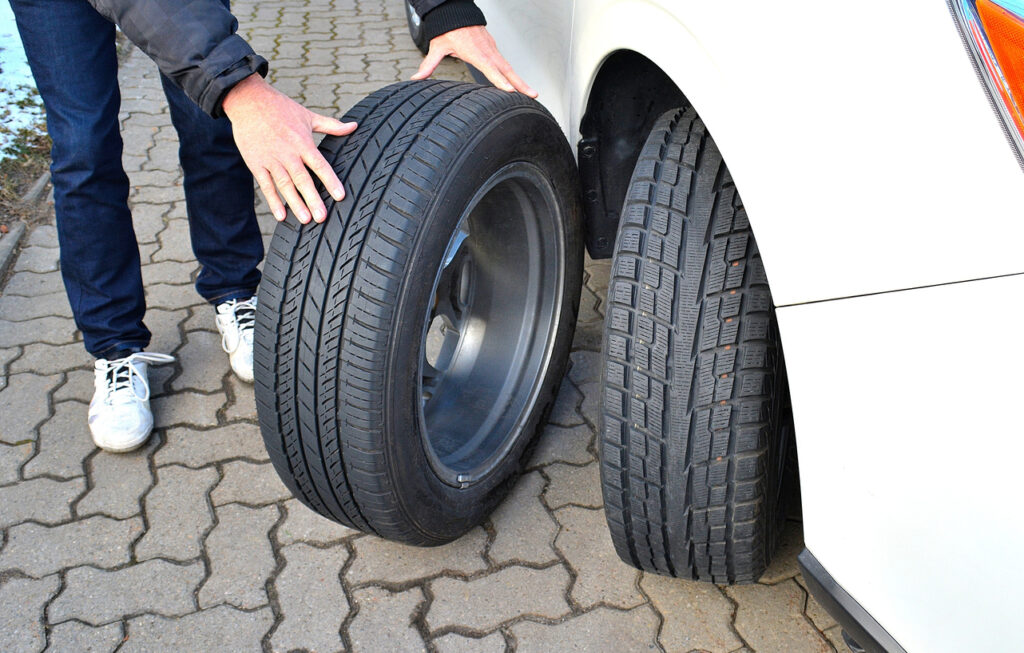Choosing the right tires is an essential part of operating a vehicle. But what kind of tires do you need? Deciding whether to use all-weather, all-season, or winter tires? The answer depends on where you live, the conditions you typically drive in, and your budget. In this post, we will discuss the attributes of all-weather, all-season, and winter tires to help you decide which kind(s) you should use.
Why Does It Matter?
The key differences between these three tire types are their tread designs and the materials that make up their compounds. These factors influence the level of control a driver is expected to have over a vehicle in specific circumstances.
Understanding the capabilities of different tires is vital to helping you operate your vehicle well, improving your mileage, and maximizing your safety and that of everyone else around you.
All-Weather Tires
With a thick, directional tread design, all-weather tires give your vehicle a steady grip on the road, even against snow, rain, and slush. Their compound allows them to remain flexible in both hot and cold temperatures. However, due to year-round use in various environments, all-weather tires generally don’t last as long as all-season or winter tires.
Transport Canada approves all-weather tires for winter driving in Canada. However, they are still inferior to winter tires when it comes maneuvering in snowy and/or extremely cold conditions.
You can tell if a tire meets the standards for winter driving if it has the symbol of a mountain with a snowflake printed on the sidewall. In Ontario, tires with this symbol are often eligible for an insurance discount. Requirements for this deduction can vary, however, so it is best to contact your insurance provider directly and ask.
If you typically drive in mild to moderate conditions and want to avoid tire changeover, consider using all-weather tires.
All-Season Tires
All-season tires are ideal for spring, summer, and fall weather. Their smooth, shallow tread design makes for a quiet ride and their hard rubber compound helps them last for a long time.
They’re less pliable, so all-season tires are not ideal for temperatures below 7°C. As a result, they are sometimes referred to as “3-season tires,” because they are not recommended for winter driving. All-season tires do not qualify for a winter tire insurance discount.
If you always drive in warm, dry, and/or mild wet climates, then all-season tires may be the right choice for you. You can also use all-season tires in combination with winter tires, rotating between the two sets around the winter months.
Winter Tires
Winter tires are designed specifically to endure tough winter weather. The compound used in winter tires is formulated to allow them to remain flexible in extremely cold temperatures, providing enhanced traction and handling on snow and ice.
The deep, chunky tread pattern of winter tires provides for extreme grip on snowy roads. For an even stronger grip, you can get studded tires. These are ideal if you will be frequently driving across rough, wet and black ice. However, they are illegal in Southern Ontario.
If you are going to use winter tires, get them fitted once the temperature is consistently low. Trac Canada recommends doing so as soon as temperatures drop below 7°C. Since they are generally only used during the winter months, winter tires will often outlive all-weather and all-season tires by comparison.
Switching your tires is an added expense if you don’t change your own tires. However, you may be able to prolong the life of your tires—and therefore save money—by using two sets year-round. Another factor that deters many people from committing to a second set is storing the set not in use. But we believe the added safety benefits of using winter tires outweigh the cost and inconvenience.

Verdict
Once you determine what kind of tires you need, conduct regular maintenance checks to ensure optimal performance. This includes assessing the tread depth to make sure it is not too worn down and checking that your tires are inflated to the recommended pressure.
If you are still unsure which tires you should get, speak to your tire dealer about your typical driving habits and the climate(s) you drive in to help you figure out the best option for you.


